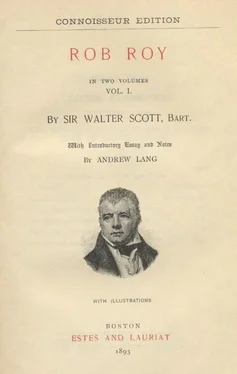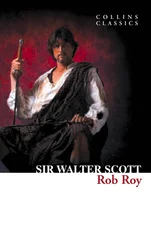Walter Scott - Rob Roy
Здесь есть возможность читать онлайн «Walter Scott - Rob Roy» — ознакомительный отрывок электронной книги совершенно бесплатно, а после прочтения отрывка купить полную версию. В некоторых случаях можно слушать аудио, скачать через торрент в формате fb2 и присутствует краткое содержание. Год выпуска: 2004, Жанр: Исторические приключения, на английском языке. Описание произведения, (предисловие) а так же отзывы посетителей доступны на портале библиотеки ЛибКат.
- Название:Rob Roy
- Автор:
- Жанр:
- Год:2004
- ISBN:нет данных
- Рейтинг книги:5 / 5. Голосов: 1
-
Избранное:Добавить в избранное
- Отзывы:
-
Ваша оценка:
- 100
- 1
- 2
- 3
- 4
- 5
Rob Roy: краткое содержание, описание и аннотация
Предлагаем к чтению аннотацию, описание, краткое содержание или предисловие (зависит от того, что написал сам автор книги «Rob Roy»). Если вы не нашли необходимую информацию о книге — напишите в комментариях, мы постараемся отыскать её.
Rob Roy — читать онлайн ознакомительный отрывок
Ниже представлен текст книги, разбитый по страницам. Система сохранения места последней прочитанной страницы, позволяет с удобством читать онлайн бесплатно книгу «Rob Roy», без необходимости каждый раз заново искать на чём Вы остановились. Поставьте закладку, и сможете в любой момент перейти на страницу, на которой закончили чтение.
Интервал:
Закладка:
In an act of Privy Council at Stirling, 22d September 1563, in the reign of Queen Mary, commission is granted to the most powerful nobles, and chiefs of the clans, to pursue the clan Gregor with fire and sword. A similar warrant in 1563, not only grants the like powers to Sir John Campbell of Glenorchy, the descendant of Duncan with the Cowl, but discharges the lieges to receive or assist any of the clan Gregor, or afford them, under any colour whatever, meat, drink, or clothes.
An atrocity which the clan Gregor committed in 1589, by the murder of John Drummond of Drummond-ernoch, a forester of the royal forest of Glenartney, is elsewhere given, with all its horrid circumstances. The clan swore upon the severed head of the murdered man, that they would make common cause in avowing the deed. This led to an act of the Privy Council, directing another crusade against the "wicked clan Gregor, so long continuing in blood, slaughter, theft, and robbery," in which letters of fire and sword are denounced against them for the space of three years. The reader will find this particular fact illustrated in the Introduction to the Legend of Montrose in the present edition of these Novels.
Other occasions frequently occurred, in which the MacGregors testified contempt for the laws, from which they had often experienced severity, but never protection. Though they were gradually deprived of their possessions, and of all ordinary means of procuring subsistence, they could not, nevertheless, be supposed likely to starve for famine, while they had the means of taking from strangers what they considered as rightfully their own. Hence they became versed in predatory forays, and accustomed to bloodshed. Their passions were eager, and, with a little management on the part of some of their most powerful neighbours, they could easily be hounded out, to use an expressive Scottish phrase, to commit violence, of which the wily instigators took the advantage, and left the ignorant MacGregors an undivided portion of blame and punishment. This policy of pushing on the fierce clans of the Highlands and Borders to break the peace of the country, is accounted by the historian one of the most dangerous practices of his own period, in which the MacGregors were considered as ready agents.
Notwithstanding these severe denunciations,—-which were acted upon in the same spirit in which they were conceived, some of the clan still possessed property, and the chief of the name in 1592 is designed Allaster MacGregor of Glenstrae. He is said to have been a brave and active man; but, from the tenor of his confession at his death, appears to have been engaged in many and desperate feuds, one of which finally proved fatal to himself and many of his followers. This was the celebrated conflict at Glenfruin, near the southwestern extremity of Loch Lomond, in the vicinity of which the MacGregors continued to exercise much authority by the coir a glaive, or right of the strongest, which we have already mentioned.
There had been a long and bloody feud betwixt the MacGregors and the Laird of Luss, head of the family of Colquhoun, a powerful race on the lower part of Loch Lomond. The MacGregors' tradition affirms that the quarrel began on a very trifling subject. Two of the MacGregors being benighted, asked shelter in a house belonging to a dependant of the Colquhouns, and were refused. They then retreated to an out-house, took a wedder from the fold, killed it, and supped off the carcass, for which (it is said) they offered payment to the proprietor. The Laird of Luss seized on the offenders, and, by the summary process which feudal barons had at their command, had them both condemned and executed. The MacGregors verify this account of the feud by appealing to a proverb current amongst them, execrating the hour (Mult dhu an Carbail ghil) that the black wedder with the white tail was ever lambed. To avenge this quarrel, the Laird of MacGregor assembled his clan, to the number of three or four hundred men, and marched towards Luss from the banks of Loch Long, by a pass called Raid na Gael, or the Highlandman's Pass.
Sir Humphrey Colquhoun received early notice of this incursion, and collected a strong force, more than twice the number of that of the invaders. He had with him the gentlemen of the name of Buchanan, with the Grahams, and other gentry of the Lennox, and a party of the citizens of Dumbarton, under command of Tobias Smollett, a magistrate, or bailie, of that town, and ancestor of the celebrated author.
The parties met in the valley of Glenfruin, which signifies the Glen of Sorrow—-a name that seemed to anticipate the event of the day, which, fatal to the conquered party, was at least equally so to the victors, the "babe unborn" of Clan Alpine having reason to repent it. The MacGregors, somewhat discouraged by the appearance of a force much superior to their own, were cheered on to the attack by a Seer, or second-sighted person, who professed that he saw the shrouds of the dead wrapt around their principal opponents. The clan charged with great fury on the front of the enemy, while John MacGregor, with a strong party, made an unexpected attack on the flank. A great part of the Colquhouns' force consisted in cavalry, which could not act in the boggy ground. They were said to have disputed the field manfully, but were at length completely routed, and a merciless slaughter was exercised on the fugitives, of whom betwixt two and three hundred fell on the field and in the pursuit. If the MacGregors lost, as is averred, only two men slain in the action, they had slight provocation for an indiscriminate massacre. It is said that their fury extended itself to a party of students for clerical orders, who had imprudently come to see the battle. Some doubt is thrown on this fact, from the indictment against the chief of the clan Gregor being silent on the subject, as is the historian Johnston, and a Professor Ross, who wrote an account of the battle twenty-nine years after it was fought. It is, however, constantly averred by the tradition of the country, and a stone where the deed was done is called Leck-a-Mhinisteir, the Minister or Clerk's Flagstone. The MacGregors, by a tradition which is now found to be inaccurate, impute this cruel action to the ferocity of a single man of their tribe, renowned for size and strength, called Dugald, Ciar Mhor, or the great Mouse-coloured Man. He was MacGregor's foster-brother, and the chief committed the youths to his charge, with directions to keep them safely till the affray was over. Whether fearful of their escape, or incensed by some sarcasms which they threw on his tribe, or whether out of mere thirst of blood, this savage, while the other MacGregors were engaged in the pursuit, poniarded his helpless and defenceless prisoners. When the chieftain, on his return, demanded where the youths were, the Ciar (pronounced Kiar) Mhor drew out his bloody dirk, saying in Gaelic, "Ask that, and God save me!" The latter words allude to the exclamation which his victims used when he was murdering them. It would seem, therefore, that this horrible part of the story is founded on fact, though the number of the youths so slain is probably exaggerated in the Lowland accounts. The common people say that the blood of the Ciar Mhor's victims can never be washed off the stone. When MacGregor learnt their fate, he expressed the utmost horror at the deed, and upbraided his foster-brother with having done that which would occasion the destruction of him and his clan. This supposed homicide was the ancestor of Rob Roy, and the tribe from which he was descended. He lies buried at the church of Fortingal, where his sepulchre, covered with a large stone, A Note A.—The Grey Stone of MacGregor. I have been informed that, at no very remote period, it was proposed to take this large stone, which marks the grave of Dugald Ciar Mhor, and convert it to the purpose of the lintel of a window, the threshold of a door, or some such mean use. A man of the clan MacGregor, who was somewhat deranged, took fire at this insult; and when the workmen came to remove the stone, planted himself upon it, with a broad axe in his hand, swearing he would dash out the brains of any one who should disturb the monument. Athletic in person, and insane enough to be totally regardless of consequences, it was thought best to give way to his humour; and the poor madman kept sentinel on the stone day and night, till the proposal of removing it was entirely dropped.
is still shown, and where his great strength and courage are the theme of many traditions. B Note B.—Dugald Ciar Mhor. The above is the account which I find in a manuscript history of the clan MacGregor, of which I was indulged with a perusal by Donald MacGregor, Esq., late Major of the 33d regiment, where great pains have been taken to collect traditions and written documents concerning the family. But an ancient and constant tradition, preserved among the inhabitants of the country, and particularly those of the clan MacFarlane, relieves Dugald Ciar Mhor of the guilt of murdering the youths, and lays the blame on a certain Donald or Duncan Lean, who performed the act of cruelty, with the assistance of a gillie who attended him, named Charlioch, or Charlie. They say that the homicides dared not again join their clan, but that they resided in a wild and solitary state as outlaws, in an unfrequented part of the MacFarlanes' territory. Here they lived for some time undisturbed, till they committed an act of brutal violence on two defenceless women, a mother and daughter of the MacFarlane clan. In revenge of this atrocity, the MacFarlanes hunted them down, and shot them. It is said that the younger ruffian, Charlioch, might have escaped, being remarkably swift of foot. But his crime became his punishment, for the female whom he had outraged had defended herself desperately, and had stabbed him with his own dirk in the thigh. He was lame from the wound, and was the more easily overtaken and killed. I always inclined to think this last the true edition of the story, and that the guilt was transferred to Dugald Ciar Mhor, as a man of higher name, but I have learned that Dugald was in truth dead several years before the battle—my authority being his representative, Mr. Gregorson of Ardtornish. [See also note to introduction, "Legend of Montrose," vol. vi.]
Интервал:
Закладка:
Похожие книги на «Rob Roy»
Представляем Вашему вниманию похожие книги на «Rob Roy» списком для выбора. Мы отобрали схожую по названию и смыслу литературу в надежде предоставить читателям больше вариантов отыскать новые, интересные, ещё непрочитанные произведения.
Обсуждение, отзывы о книге «Rob Roy» и просто собственные мнения читателей. Оставьте ваши комментарии, напишите, что Вы думаете о произведении, его смысле или главных героях. Укажите что конкретно понравилось, а что нет, и почему Вы так считаете.









